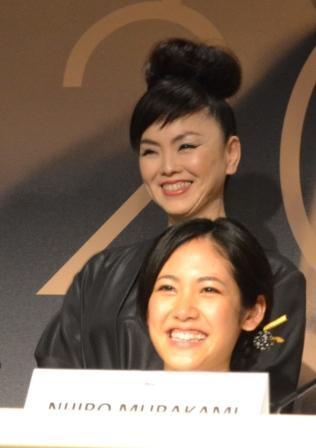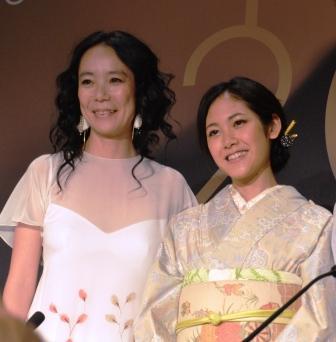As a surfer, any film that begins with ocean waves rushing towards the coast will draw me in, even if they are closing-out. Hence I was immediately drawn into Naomi Kawase's Still the Water, a quiet poetic film with many shots of water, sun-lit banyan trees, glimmering yellow moons, to the sound of waves, rain and wind. The focus of this symbolic tale are two adolescent children, a boy and a girl, both grappling with profound realizations about the transience of life. The girl's beautiful mother --with whom the girl nestles and sings ever so often, in the afternoon sun--is dying. The boy must face the break-up of his family, and the disturbing (for him) sexuality of his now single mother. In the meantime, the boy and girl fall in love, yet another transformation. Throughout, the force of nature is emphasized, in the lyrical images of ocean waves and trees, as well as in the words of the girl's dying mother, a shaman. This woman, who connects "the gods with humans" teaches her daughter that "to live is to die."
That this film is told through the eyes of the children underscores the simplicity of its message: what the human being faces in life, be it death or suffering, is not to overwhelm them, but to be accepted and embraced. A metaphor repeated in the film, apropos of death, is one from surfing (!). The girl's father, a surfer, recounts how when taking a wave, you become one with its incredible energy. "When you feel that force with your entire body, everything becomes nothing and there is a sense that all, including yourself, is quiet."
It is this quietness that the film achieves.
What is less successful is that several key scenes seem overdetermined with the "message" behind them, especially an opening shot of a goat's throat being slit and a closing shot of naked swimming with bubbles rising. In these shots, we can sense the director behind the image--her aim to assert a a poetic message---more than the poetry itself. Saving the film from the risk of falling into sweet banality, however, is that one feels that the story comes from a "real" place, not only the real island of Amami-Oshima but from a thought-out conviction of the filmmaker's.
I turned to director Naomi Kawase to discuss, thankful for the rare opportunity here at Cannes---where so many films deal with incest, pedophilia, murder, and self-loathing---to talk about the spiritual.
Director Naomi Kawase with actress Jun Yoshinaga
Can you comment on your own personal belief about death?
At the moment we are born, we are to die. We are born to someone, and we will die. We tend to forget the link we have with death, with the generations behind us, and the generations in front of us. We forget that death is a link. I chose to make this film after the death of my adoptive mother, the woman who raised me. When the person who mothered you disappears, you have to rebuild yourself.
I went to this island, Amami. I respected very much the philosophy of the village. Death is not sad. It is the moment when you transmit life from the mother to the daughter. In my film, the scene of the local people dancing and singing expresses this act of transmission. What is important is that it is oral transmission: the words, the lyrics, music has been transmitted generation to generation. The dead are in this song.
And gods? In this film, the mother is a shaman, a mediator between gods and humans. She believes gods are everywhere. Do you feel the same?
Gods are very important on the island of Amami. Shamans are very important. They believe--and I believe--that the wind, the sun, the trees are inhabited by gods. It is a form of pantheism: there are lots of gods, hundreds of thousands, and you can communicate with them all over the place. I think this belief is especially important in Japan because so many lives have been taken away by nature, by volcanoes, earthquakes, Tsunamis. In a country where there are so many natural disasters, it helps you to pray to these gods. As for the nature in my film: what I like about the beauty of nature is the fear that it inspires. During a catastrophe, like Fukushima, nature takes control, but people continue living. On the island of Amami, one sees the force of the waves. The inhabitants co-exist with these waves that can take them away.
And surfing?
Amami is a mecca for surfers. I learned everything I know about surfing from speaking to a community of people there called "soul surfers". They surf with more than their board. They surf with their soul.


